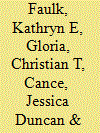|
|
|
Sort Order |
|
|
|
Items / Page
|
|
|
|
|
|
|
| Srl | Item |
| 1 |
ID:
114023


|
|
|
|
|
| Publication |
2012.
|
| Summary/Abstract |
Using the Broaden-and-Build Theory of Positive Emotions, the relationships among stress, positivity, and depressive symptoms were examined in a sample of military spouses during deployment (N = 367). Over one-third of the spouses reported moderately severe levels of depressive symptoms. After controlling for demographic and deployment variables, stress had a positive association with depressive symptoms (ß = .59, p < .001), while positivity had a negative association (ß = -.39, p < .001). Positivity was also found to play a moderating role on the relationship between stress and depressive symptoms (ß = -.29, p < .001). Spouses with lower positivity reported more depressive symptoms at both low and high levels of stress compared to those with higher positivity. The final model, including both direct and moderating variables, accounted for 69 percent of the total variance in depressive symptoms. Practical implications are discussed in terms of the importance of developing positivity in military spouses.
|
|
|
|
|
|
|
|
|
|
|
|
|
|
|
|
| 2 |
ID:
094142


|
|
|
|
|
| Publication |
2010.
|
| Summary/Abstract |
A survey of military wives (N = 77) identifies their most stressful experiences, self-appraised control over these stressors, and coping strategies used. The authors examine two competing hypotheses: the goodness-of-fit hypothesis that the effects of problem-focused coping (PFC) and emotion-focused coping (EFC) strategies on distress are moderated by the appraised controllability of the stressor, and the main-effects hypothesis that PFC strategies are more effective than EFC strategies in reducing distress regardless of appraisal of controllability. Wives identified deployment of soldiers as their most stressful experience, and reported using PFC strategies more frequently than EFC strategies. EFC strategies were predictive of greater physical symptoms of illness, while PFC strategies were related to reduced physical symptoms of illness only when military wives' perceived control of the situation was low. PFC strategies and controllability were significantly related to decreased depressive symptoms; EFC was marginally related to increased depressive symptoms, lending greater support to the main-effects hypothesis.
|
|
|
|
|
|
|
|
|
|
|
|
|
|
|
|
|
|
|
|
|